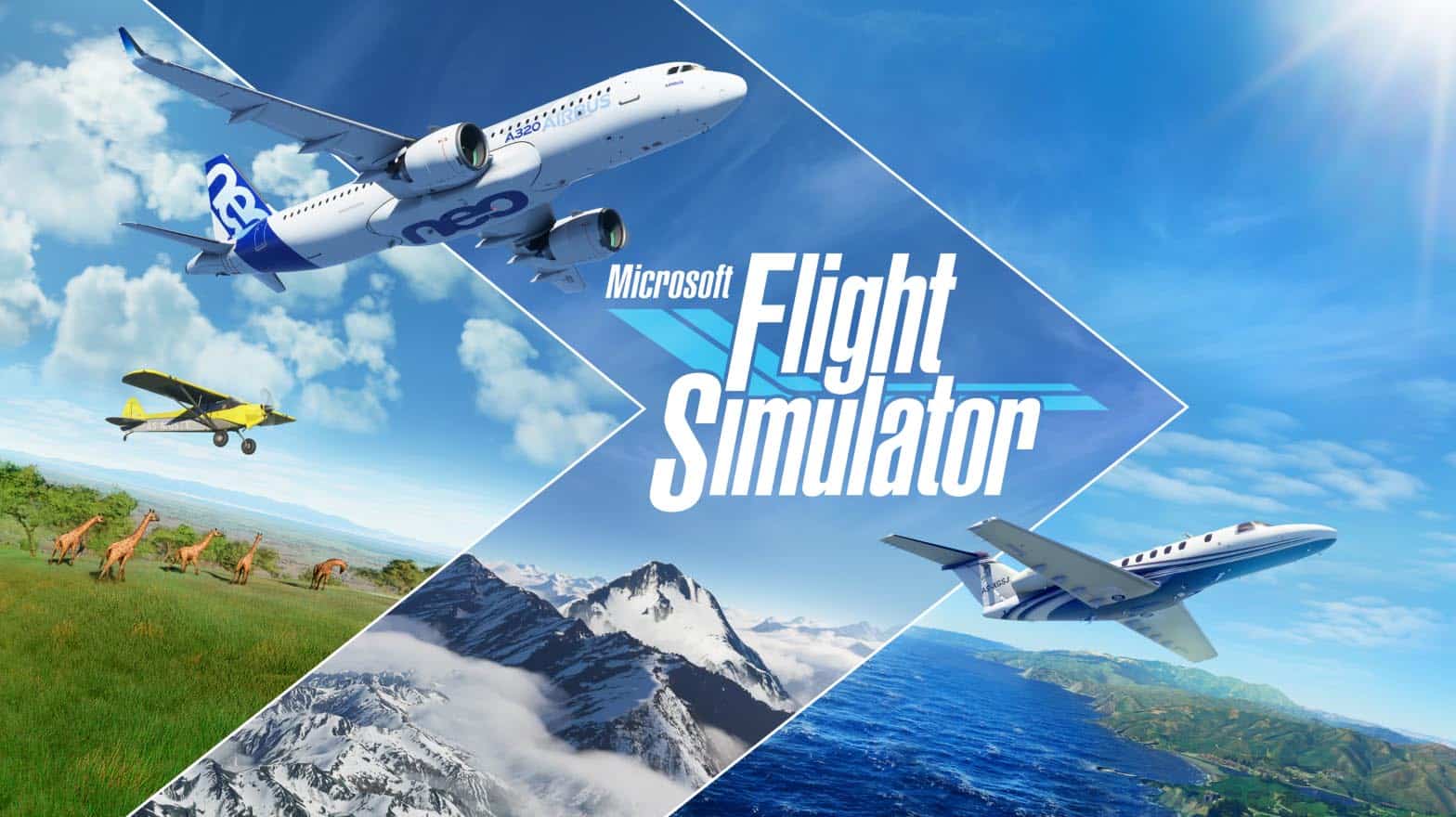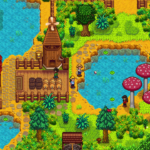Simulation games let you try out jobs, hobbies, and adventures that might be too risky or costly in real life. From flying planes to building cities, these games put you in control of worlds both realistic and fantastical. The best PC simulation games offer deep, engaging experiences that can keep players entertained for hundreds of hours while teaching them new skills and concepts.
PC gaming is perfect for simulation titles because of the precise controls and processing power needed for complex simulations. Keyboards and mice allow for detailed management that console controllers can’t match. Plus, the PC platform gets many simulation games that never reach other systems, giving computer gamers more options to choose from.
1. Microsoft Flight Simulator
Microsoft Flight Simulator stands as the flagship of aviation simulation games on PC. The 2020 release took the gaming world by storm with its stunning visuals and realistic flying experience.
This simulator uses real-world data to create an accurate digital twin of our planet. Players can fly over their own homes or explore famous landmarks with incredible detail. The clouds, weather systems, and lighting effects all behave like they do in real life.
For beginners, Microsoft Flight Simulator offers a friendly entry point. It includes training modules and assists that help new pilots learn the basics. You can gradually increase difficulty as your skills improve.
Microsoft Flight Simulator lets you fly everything from light planes to commercial jets. Each aircraft feels different to control, with unique cockpits and handling characteristics.
The game shines in its attention to detail. From air traffic control chatter to accurate airport layouts, it creates a convincing simulation. Weather changes in real-time based on actual conditions around the world.
Graphics quality sets this simulator apart from competitors. Mountains, cities, and oceans look nearly photorealistic, especially on high-end PCs. Many players use the game simply to sightsee from above.
For serious simulation fans, the game supports add-ons and custom controls. You can use flight sticks, throttle quadrants, and rudder pedals for the full cockpit experience.
Updates continue to improve the game since its launch. New aircraft, airports, and features get added regularly, keeping the experience fresh. The developers listen to the community and make changes based on feedback.
Many reviewers consider Microsoft Flight Simulator the most accessible yet comprehensive flight sim available. It balances realism with enjoyment, making it suitable for casual players and aviation enthusiasts alike.
2. Kerbal Space Program
Kerbal Space Program combines serious physics simulation with playful, cartoon-like aliens called Kerbals. The game challenges players to build rockets, aircraft, and other vehicles that actually follow real-world physics laws.
Players can choose from three different gameplay modes. In Science Mode, you perform experiments to unlock new technologies. This creates a natural progression as your space program advances.
The game rewards both creativity and technical knowledge. While it looks cartoonish, Kerbal Space Program is considered an outstanding space sim that accurately models orbital mechanics and rocket design principles.
Many players find Kerbal Space Program educational. It teaches real concepts about space travel, thrust-to-weight ratios, and orbital mechanics without feeling like a textbook.
The modding community has created thousands of add-ons that expand the game. These range from new spacecraft parts to entire planet systems, giving the game tremendous replay value.
Some organizations take this game seriously. Similar to how X-Plane is used by NASA, Kerbal Space Program has earned respect for its accurate physics modeling.
The game runs best on computers with at least a Core i5 processor and 4GB of RAM. While not demanding by today’s standards, having a dedicated GPU helps when building complex spacecraft.
Failure is part of the fun in KSP. Rockets explode, astronauts get stranded in orbit, and landing on other planets often ends dramatically. These “learning experiences” encourage players to refine their designs.
PC Gamer awarded Kerbal Space Program its Best Simulation award, recognizing its unique blend of scientific accuracy and approachable gameplay.
3. Cities: Skylines
Cities: Skylines stands as a benchmark in city-building simulation games. Released by Paradox Interactive, it offers players a modern take on classic city simulations with fresh gameplay elements that capture both the excitement and challenges of urban development.
The game puts you in charge of a growing city where you’ll zone residential, commercial, and industrial areas. You’ll also build roads, manage public services, and deal with issues like traffic congestion and pollution.
What makes Cities: Skylines special is its depth. The game strikes a balance between accessibility and complexity that appeals to both new players and simulation veterans.
The building mechanics feel intuitive but leave room for creativity. You can create anything from small towns to massive metropolises with distinct districts and neighborhoods.
Traffic management emerges as one of the game’s central challenges. Players must carefully plan road networks and public transportation systems to keep their cities moving efficiently.
Cities: Skylines also boasts an active modding community. The Steam Workshop offers thousands of assets, maps, and gameplay modifications that extend the experience far beyond the base game.
Some players consider it the worthy successor to SimCity 4, which many regard as one of the best city simulators ever made.
The game includes expansion packs that add seasons, natural disasters, and night/day cycles. These additions create more dynamic and realistic city environments.
For anyone interested in urban planning or infrastructure design, Cities: Skylines provides a satisfying playground. The game lets you experiment with different city layouts and policy decisions without real-world consequences.
While not without flaws, Cities: Skylines remains a top choice for simulation fans. Its blend of detailed systems, creative freedom, and strategic challenge delivers a compelling experience that keeps players coming back to build just one more neighborhood.
4. Dwarf Fortress
Dwarf Fortress has earned legendary status in the simulation game world. Originally released as a text-based game with ASCII graphics, it now has a more accessible Steam version with improved visuals and interface.
The premise is simple: guide a group of seven dwarves to build a thriving fortress. But beneath this simple concept lies incredible depth and complexity. Players must manage resources, excavate mountains, create living quarters, and defend against threats.
What makes Dwarf Fortress special is its world generation. The game creates detailed histories, civilizations, and geography before you even start playing. This deeply generated world provides a rich backdrop for your fortress.
The game excels at creating emergent storytelling. Small decisions can lead to unexpected consequences, from flooding your fortress by accident to awakening ancient horrors. These moments become memorable stories unique to your playthrough.
Failure is part of the experience. The unofficial motto “Losing is fun” captures the spirit of the game. A single mistake can trigger a chain of disasters that doom your fortress, but these dramatic collapses often make the best stories.
Combat, trade, crafting, and social systems all intertwine in Dwarf Fortress. Dwarves have distinct personalities, preferences, and skills that affect their performance and happiness. They form relationships, hold grudges, and may even throw tantrums if unhappy.
The learning curve is steep but rewarding. New players should expect to fail repeatedly before grasping the fundamentals. Tutorials and community guides can help overcome initial frustrations.
Despite its complexity, Dwarf Fortress offers unparalleled freedom. You can focus on creating an artistic masterpiece, a military stronghold, or a trading empire. The game builds stories organically through gameplay rather than scripted events.
For simulation fans seeking depth and replayability, few games match what Dwarf Fortress offers. Each fortress becomes a unique narrative shaped by your decisions and the game’s complex systems.
5. RimWorld
RimWorld is a sci-fi colony simulator that puts players in charge of managing a group of colonists on a distant planet. Created by Ludeon Studios, this game has gained a loyal following for its deep mechanics and storytelling capabilities.
The game begins with three survivors of a spaceship crash. Your job is to help them build a colony that can thrive in harsh conditions. Each colonist has unique traits, skills, and backstories that affect how they function in your settlement.
What makes RimWorld special is its AI storyteller system. These storytellers control the events that happen to your colony, creating different experiences each time you play. They can send helpful traders or deadly raids depending on how well you’re doing.
The gameplay focuses on survival, base building, and resource management. You’ll need to grow food, build shelters, and defend against threats including hostile factions and dangerous wildlife.
RimWorld offers incredible depth with its mood system, where colonists have emotional responses to their experiences. A colonist who loses a friend might fall into depression, while one who sleeps in a beautiful room will get mood boosts.
Many players who enjoy RimWorld also like games such as Oxygen Not Included, Project Zomboid, and Factorio. The game has inspired many similar colony simulators due to its success.
The game draws inspiration from Dwarf Fortress, Firefly, and Dune, combining complex simulation systems with a more approachable interface. Its modding community has created thousands of additions that can drastically change your experience.
Sometimes called a “story and warcrime simulator” by fans, RimWorld allows for both compassionate colony management and morally questionable tactics. The game never judges your choices, instead using them to generate more stories.
RimWorld is available on PC, PlayStation 4, and Xbox One, with the PC version offering the most extensive modding options.
6. Factorio
Factorio is a game that focuses on building and automating factories in an infinite 2D world. Players gather resources and craft increasingly complex items while managing production lines and logistics.
The game offers deep complexity with its automation systems. You’ll place mining drills to extract raw materials, set up assembly machines to craft components, and create intricate transport belt networks to move everything around.
Combat adds another layer to the experience. As your factory grows, it pollutes the environment and attracts hostile alien creatures. You’ll need to research and build weapons and defenses to protect your creation.
Factorio’s optimization is impressive. Even with massive factories containing thousands of moving parts, the game runs smoothly. This lets players build truly enormous production facilities without performance issues.
The game supports multiplayer, allowing friends to collaborate on factory designs. You can also extend your experience with mods written in Lua, creating custom maps, or adding new content.
Factorio has earned very positive reviews on Steam, where players praise its depth and replayability. Many gamers report hundreds or even thousands of hours played, showing its addictive nature.
Planning efficient layouts becomes a puzzle in itself. You’ll constantly look for ways to improve your designs, eliminate bottlenecks, and increase production rates.
The satisfying automation gameplay has inspired many similar titles, but Factorio remains a standout in the genre. Its focus on logistics and production challenges makes it unique among simulation games.
For players who enjoy problem-solving and optimization, Factorio offers a nearly endless playground. The sense of accomplishment when your factory runs smoothly is hard to match in other games.
7. The Sims 4
The Sims 4 remains one of the most popular life simulation games on PC since its release. Players can create and control virtual people in a sandbox environment, guiding them through life experiences from birth to death.
The game shines with its character creation tools. You can craft Sims with unique personalities, aspirations, and physical traits that influence how they interact with the world around them.
Building homes is another key feature that keeps players engaged. From modest starter homes to lavish mansions, the building system offers plenty of creative freedom for designing living spaces.
The Sims 4 has expanded significantly through numerous expansion packs, game packs, and stuff packs. These add new careers, hobbies, locations, and items to enhance gameplay.
Want to send your Sims to college? There’s a pack for that. Prefer they become famous or explore the outdoors? Those options exist too. Each expansion adds fresh dimensions to the base game.
EA regularly updates the game with free content and bug fixes. They’ve also made the base game free-to-play, making it more accessible to new players curious about the franchise.
The community around The Sims 4 is active and creative. Players share custom content, challenges, and storytelling ideas that extend the game’s lifespan and appeal.
While the base game offers plenty of fun, many players find that adding at least a few expansion packs significantly improves the experience. Popular choices include Seasons, which adds weather systems, and Cottage Living for farming elements.
Steam regularly offers discounts on The Sims 4 and its numerous expansion packs, making it easier to build your collection over time.
8. Planet Coaster
Planet Coaster stands as one of the best theme park simulation games available on PC. Released by Frontier Developments, it gives players complete control over designing and managing their dream amusement parks.
The game shines with its impressive building tools. You can craft detailed roller coasters piece by piece or place pre-made designs throughout your park. The freedom to create is nearly limitless.
What sets Planet Coaster apart is how it balances creativity with management challenges. You’ll need to handle staff hiring, set entrance fees, and make sure visitors enjoy their experience. These elements add depth without becoming overwhelming.
The graphics deserve special mention too. The vibrant visuals bring your park to life, from the excited expressions of guests to the intricate details on rides and decorations.
Planet Coaster includes a career mode with specific goals and a sandbox mode where you can build without financial limits. This variety keeps the gameplay fresh for many hours.
The community around the game continues to create and share custom content. Players can download new rides, decorations, and even entire parks made by others through the Steam Workshop.
A sequel, Planet Coaster 2, is set to expand on the original with water parks and other new features. The original game established itself as the future of coaster park simulation games with its blend of creative tools and management systems.
Many fans consider it a perfect balance of realism, flexibility, and playability. The game offers enough depth for simulation enthusiasts while remaining accessible to casual players.
If you enjoy building things and managing resources, Planet Coaster delivers a rewarding experience. Few other simulation games match its combination of creative freedom and strategic gameplay.
9. Transport Fever 2
Transport Fever 2 stands as a gold standard in the transportation simulation genre. Players build and manage transportation networks across land, water, and air, creating complex logistical systems that evolve through time.
The game features impressive historical accuracy, letting you progress from the 1850s to modern times. You’ll watch as steam engines give way to diesel locomotives and eventually electric trains, with each era bringing new vehicles and challenges.
What sets Transport Fever 2 apart is its focus on economic systems. Your transportation networks need to meet actual demands between cities and industries to be profitable. This creates a satisfying puzzle where you must connect resources to factories and goods to consumers.
The world-building options are extensive. You can shape the terrain, create waterways, and develop cities that grow based on your transportation choices. Cities expand along your routes, making your decisions feel meaningful.
Graphics in Transport Fever 2 are detailed and attractive. Watching your trains wind through mountains or ships navigate your harbors provides a genuine sense of accomplishment. The detailed logistics simulation is particularly praised, though some find the pace quite slow.
The game offers three distinct modes. Campaign mode teaches you the basics through historical scenarios. Free play gives you complete freedom to build without restrictions. Scenarios offer specific challenges with defined goals.
One potential drawback is the game’s slower pace. Transport Fever 2 requires patience as you wait for cities to grow and profits to accumulate. However, many players find this deliberate pace part of its charm.
The modding community actively creates new content, extending the game’s lifespan with custom vehicles, maps, and gameplay modifications. This adds tremendous value beyond the base game experience.
For those interested in transportation management with real economic consequences, Transport Fever 2 delivers a deep and rewarding experience that balances complexity with accessibility.
10. Elite: Dangerous
Elite: Dangerous stands out in the simulation genre as a massive space exploration game. Players pilot their own starships across a full-scale recreation of the Milky Way galaxy. The game gives you freedom to chart your own path as a trader, explorer, bounty hunter, or pirate.
The flight model is often praised as one of the best in any space game. The controls feel responsive and authentic, creating a strong sense of actually piloting a spacecraft. This attention to realistic physics sets it apart from other space sims.
The game’s scale is truly impressive. With billions of star systems to explore, Elite: Dangerous creates an authentic feeling of vastness that few games match. Many systems are procedurally generated, but they follow scientific principles, making the universe feel believable.
Players can upgrade their ships, trade goods between stations, mine asteroids, and engage in combat. The progression system rewards dedication, as better ships and equipment require significant time investment.
The multiplayer aspect adds another layer to gameplay. You can join with friends to take on challenges or engage in player-versus-player combat. Some players form groups to influence the game’s background political simulation.
Elite: Dangerous has been described as definitive in the space epic genre. The learning curve is steep, though. New players should expect to spend time mastering the controls and understanding the game’s systems.
The visuals deserve special mention. Space looks stunning, with realistic star systems, planets, and nebulae creating memorable sights. The cockpit view enhances immersion as you navigate through the cosmos.
For those who enjoy simulation depth, the game offers complex systems covering everything from power management to market economics. This makes it particularly appealing to hardcore space simulation fans.
Defining Simulation Games on PC
Simulation games aim to recreate real-world activities or systems with varying levels of accuracy and detail. They put players in control of environments that mimic reality, from driving vehicles to managing cities.
Core Elements of Simulation Games
Simulation games typically feature realistic physics and detailed mechanics. They focus on accuracy rather than simplified gameplay found in other genres.
Most simulation games include:
- Authentic systems that mirror real-world processes
- Detailed controls that replicate actual operation
- Progressive complexity that reveals deeper mechanics over time
- Open-ended gameplay with few forced objectives
Good simulation games balance realism with accessibility. Flight simulators might include accurate cockpit controls while still helping new players learn.
The best simulations make players feel like genuine experts in their chosen field. Whether it’s designing a city’s infrastructure or flying a Boeing 747, the satisfaction comes from mastering complex systems.
Difference Between Simulation and Other Game Genres
Simulation games stand apart from other genres through their commitment to realism and authenticity. Unlike action games focused on excitement or RPGs centered on character development, simulations prioritize accurate representations of their subjects.
Key distinctions include:
- Goal structure – Simulations rarely have “win conditions” but instead focus on the experience itself
- Learning curve – Most simulation games require significant time investment to master
- Agency approach – Players often manage systems rather than individual characters
While sandbox games like Minecraft share open-ended gameplay with simulations, they typically emphasize creativity over realism. Strategy games may involve complex systems but focus more on competition than accurate simulation.
Some games blend elements, creating “simulation-lite” experiences that balance realism with accessibility for wider appeal.
Understanding the Appeal
Simulation games offer a unique blend of freedom and complexity that attracts players seeking experiences beyond traditional gaming narratives. These games create spaces where players can experiment without the pressure of winning or losing.
Immersive Realism and Authenticity
Simulation games stand out for their dedication to realistic details and authentic experiences. Players are drawn to the freedom these games provide, allowing them to operate complex machinery or systems with fewer restrictions than traditional games.
The appeal often lies in the satisfaction of mastering intricate systems. Whether piloting a commercial aircraft or managing a power plant, these games reward patience and attention to detail. Players enjoy the sense of accomplishment that comes from successfully executing challenging tasks.
Visual and audio design also plays a crucial role in creating immersion. Modern simulation games feature detailed environments, realistic physics, and authentic sound effects that make virtual experiences feel genuine.
Educational Benefits and Skill Development
Many simulation games offer more than entertainment—they provide valuable learning opportunities. Players can gain knowledge of real-world systems and processes while enjoying themselves, making these games effective educational tools.
Some titles teach specific technical skills. Flight simulators, for instance, help players understand basic aviation principles and procedures. Similarly, business simulations teach economic concepts and strategic thinking.
Problem-solving abilities improve through gameplay that requires quick thinking and adaptation. When managing a virtual city or hospital, players must make decisions under pressure and learn from their mistakes.
This educational aspect gives simulation games an enduring appeal that extends beyond pure entertainment. Players value the practical knowledge they gain while investing time in these detailed virtual worlds.
Frequently Asked Questions
Simulation games offer diverse experiences from flight and city-building to life simulations. Players often have specific questions about which games provide the most immersive or realistic gameplay options.
What are the most immersive simulation games available on PC?
Microsoft Flight Simulator stands out for its incredible realism and stunning visuals. It uses real-world data to create accurate landscapes and weather patterns.
RimWorld creates deep immersion through its detailed colony management and storytelling systems. Each playthrough feels unique because of its AI storyteller.
Cities: Skylines offers immersive city-building with realistic traffic flow and city management challenges. The game’s attention to detail makes the virtual cities feel alive.
Dwarf Fortress provides unmatched depth in its simulation. The game tracks individual histories and personalities of each dwarf, creating a rich world that feels truly lived-in.
Which free-to-play simulation games for PC are recommended by the gaming community?
War Thunder is a popular free military vehicle simulator with realistic physics and damage models. It offers both air and ground combat simulations.
Roblox contains many user-created simulation games that are free to play. These range from life simulators to business management games.
World of Warships provides a free naval warfare simulation with detailed ship models and combat mechanics. It’s praised for its historical accuracy.
What are the best simulation games for PC that offer a realistic life experience?
The Sims 4 remains the top life simulation game according to many players. It lets you create characters and guide them through life stages.
Farming Simulator offers a realistic agricultural experience. Players manage crops, livestock, and equipment with authentic machinery from real-world brands.
House Flipper gives players the experience of renovating homes with realistic tools and tasks. It simulates everything from demolition to furniture placement.
Can you list top-rated offline simulation games that are free to download for PC?
OpenTTD (Open Transport Tycoon Deluxe) is a free, open-source transportation management simulator. It lets you build and manage transport networks without an internet connection.
FlightGear is a free, open-source flight simulator that works completely offline. It offers realistic aircraft physics and worldwide scenery.
Dwarf Fortress has a free version that works offline. This complex simulation game tracks hundreds of parameters in its world generation.
Are there any simulation games on PC that come highly recommended by Reddit users?
Kerbal Space Program is frequently praised on Reddit for its physics-based space flight simulation. Users love its challenging but rewarding gameplay.
RimWorld gets many positive mentions for its colony management and storytelling depth. Reddit users often share their dramatic colony stories.
PC Building Simulator receives good feedback for its accurate representation of computer assembly. Many users report learning real PC building skills from the game.
What simulation games on PC provide the best sandbox experience for creative gameplay?
Cities: Skylines offers an extensive sandbox mode with unlimited money and all buildings unlocked. Players can focus on creating beautiful cities without economic constraints.
Planet Coaster gives players remarkable freedom to design and build theme parks. Its powerful creation tools allow for incredibly detailed custom rides and scenery.
Minecraft, though not strictly a simulation game, provides sandbox elements with redstone mechanics that simulate electrical circuits. Players have built working computers inside the game.
Kerbal Space Program’s sandbox mode lets players experiment with spacecraft design without mission constraints. The physics-based gameplay encourages creative problem-solving.







